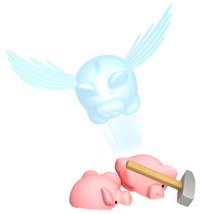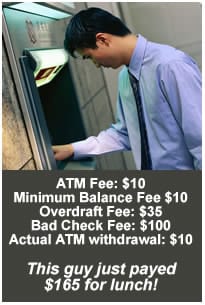 Don’t let your bank profit from overdraft fees! In 2009, it’s estimated that banks earned $20 billion (yes, with a b) in overdraft fees Transactions from ATM machines, debit cards and reoccurring bill payment transactions are mainly responsible for record overdrafts These are invisible money transactions because you can’t see how much you’re spending or how much you have left in your account.
Don’t let your bank profit from overdraft fees! In 2009, it’s estimated that banks earned $20 billion (yes, with a b) in overdraft fees Transactions from ATM machines, debit cards and reoccurring bill payment transactions are mainly responsible for record overdrafts These are invisible money transactions because you can’t see how much you’re spending or how much you have left in your account.
With the new Credit Card Act of 2009, things are changing.You will not be able to automatically overdraw your bank account.Instead, your transaction will be declined.But, that information may come too late to save you from difficulties with creditors and merchants.
The only way to prevent overdrafts is to keep good financial records You must know how much you have available at any given point Better yet – use cash According to studies, people who use actual cash spend 20% less than using other forms of payments That’s because they can see how much money they have left after making a purchase If you choose to use cash, use larger bills The larger the bill, the less likely you are to spend it It is so much easier to spend $5, $10 and $20 It doesn’t seem like much if you spend $20 in 5 different stores But if you have to break a $100 bill, you will have a true understanding of how much you’ve spent.
If you still want to use invisible money, and you aren’t going to track your account, you will have to opt-in with your bank to have your transactions pre-approved Remember that you will still have the fees associated with overdrawing your account.Those fees are typically over $35 for each transaction.
Spend wisely by avoiding fees Avoid fees by keeping good records or by using cash Overdraft fees are a total waste of your hard earned money.


